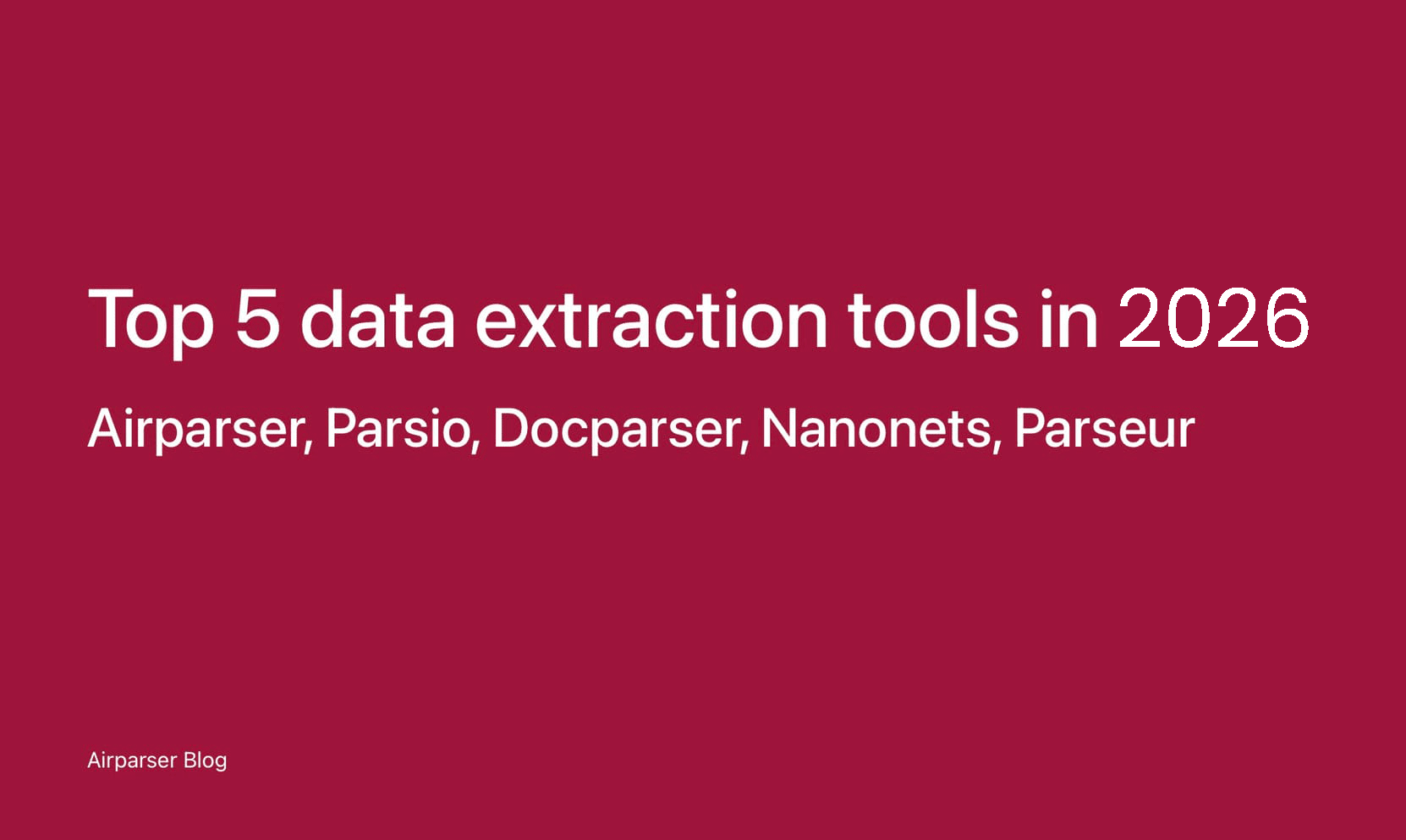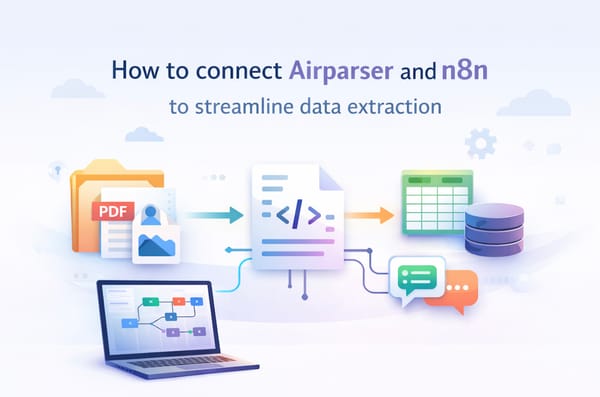Top 5 data extraction tools in 2026
Compare five top data extraction tools: Airparser, Parsio, Docparser, Nanonets, and Parseur. Discover features, pricing, and the best fit for your workflow needs.

Data extraction tools are essential for automating workflows and improving efficiency. In this article, we review five popular tools: Airparser, Parsio, Docparser, Nanonets, and Parseur. Each tool has unique capabilities, supported document formats, and different parsing engines. We will also look at their pricing models to help you choose the right tool for your needs.
1. Airparser
Document Formats
Airparser is versatile in handling various document types. It supports PDFs, images, emails, HTML, text files and more. This wide range of supported formats makes it suitable for diverse use cases.
Parsing Engine
Airparser uses advanced AI and machine learning algorithms for data extraction. It incorporates zonal OCR (Optical Character Recognition) to detect and read text from specific areas of documents. Additionally, it leverages natural language processing (NLP) and GPT (Generative Pre-trained Transformer) models to understand and extract contextual information. This combination of technologies allows Airparser to handle complex documents with high accuracy.
Pricing
Airparser offers a tiered pricing model. The basic plan starts at $39 per month offering 100 credits, allowing you to parse up to 100 images, scanned documents, or handwritten texts. For businesses with higher volume needs, there are other tiers offering 500 credits, 2,000 credits, and 5,000 credits per month. Airparser also offers a free trial offering 30 credits allowing you to parse up to 30 emails, documents, or PDF pages.
2. Parsio
Document Formats
Parsio is designed to work with various formats, including PDFs and email files. This flexibility allows users to extract data from different sources, making it a comprehensive solution for many industries.
Parsing Engine
Parsio has three different parsing engines - template-based parser, AI-powered parser, and GPT-powered parser. The template-based parser is best suited for parsing emails with fixed layout. AI-powered parser is best suited for PDF files. The pre-trained AI model extracts all the information from invoices, receipts, business cards, and other PDF documents. The GPT-powered parser is for parsing more complex and unstructured documents, PDF, and emails.
Pricing
Parsio offers a free trial allowing you to parse 30 emails, PDFs, or documents. The paid versions start at $41 per month, which includes processing up to 1000 emails, PDFs, or documents. There are other tiers as well, offering 5,000 credits and 12,000 credits per month, at $124 and $249 per month, respectively.
3. Docparser
Document Formats
Docparser focuses on PDF and image files but offers data extraction from word documents. This makes it suitable for businesses that primarily deal with these formats for invoices, receipts, and other business documents.

Parsing Engine
Docparser employs zonal OCR for its data extraction tasks. Users can define zones within documents where the data resides, and the tool reads the information from these zones. It also offers rule-based parsing and pattern recognition, which helps in extracting data from structured documents like forms and tables accurately. While it doesn’t use advanced AI models like GPT, its rule-based system is highly reliable for repetitive and structured documents.
Pricing
Docparser offers a flexible pricing structure starting at $39 per month for the starter plan, which includes processing up to 100 documents. For higher volumes, the professional plan is $74 per month, business plan is available at $159 per month, and custom enterprise plans are also provided for businesses with extensive needs.
4. Nanonets
Document Formats
Nanonets supports a wide variety of document types, including PDFs, images, scanned documents, and text files. Its versatility makes it suitable for different data extraction needs across various industries.

Parsing Engine
Nanonets stands out by using deep learning and AI for its parsing engine. It incorporates OCR capabilities enhanced by machine learning models to extract data from documents. Additionally, it uses NLP and custom-trained AI models to handle unstructured and semi-structured data. Nanonets’ engine can learn and improve over time, making it increasingly accurate with continuous use.
Pricing
Nanonets offers a flexible pricing model based on the number of documents processed. The starter plan is a pay as you go plan with the first 500 pages for free. The pro tier is available at $999 per month per workflow, whereas for the pricing of the enterprise plan, one needs to connect with Nanonets team.
5. Parseur
Document Formats
Parseur is known for its ability to handle emails, PDFs, and other documents. This range of supported formats ensures that it can be integrated into various business processes seamlessly.

Parsing Engine
Parseur uses template-based parsing with AI enhancements. Users set up parsing rules and templates to specify what data to extract and from where. The tool uses OCR to read text from images and PDFs and applies AI to improve the accuracy and adaptability of data extraction.
Parseur also offers zonal OCR for parsing PDFs, which is ideal for converting PDFs with the same layout. However, if the PDF layout changes (such as invoices from different providers), the parsing will fail.
Pricing
Parseur offers a free plan allowing you to process 20 pages per month. It also has a pay as you grow service, priced at $0.33 per page. For enterprise needs, one needs to connect with the service support team.
Use Cases and Benefits
- Airparser - Ideal for businesses needing to extract data from a mix of documents like PDFs and images. Its advanced AI makes it suitable for complex and varied document types.
- Parsio - suited for different document types. The template-based parser can be used for emails with fixed layout. AI-powered parser is best suited for invoices, receipts, business cards, and other PDF documents. The GPT-powered parser can be used for parsing PDFs and documents where other parsers failed.
- Docparser - Perfect for businesses dealing with invoices, receipts, and forms that follow a consistent structure. Its rule-based system ensures reliable extraction.
- Nanonets - Versatile and powerful, making it suitable for industries requiring deep learning capabilities for diverse document types. However, its higher pricing is a disadvantage, making it more accessible primarily to larger companies.
- Parseur - Great for email parsing and documents with predictable structures. Its template and AI combination offers a balance between ease of use and adaptability.
Conclusion
Each of these data extraction tools offers unique advantages depending on the specific needs of a business. Airparser and Nanonets provide advanced AI capabilities for complex documents, while Docparser excels with structured forms. Parsio and Parseur offer flexible template-based parsing enhanced with AI, making them suitable for a range of structured and semi-structured documents.





